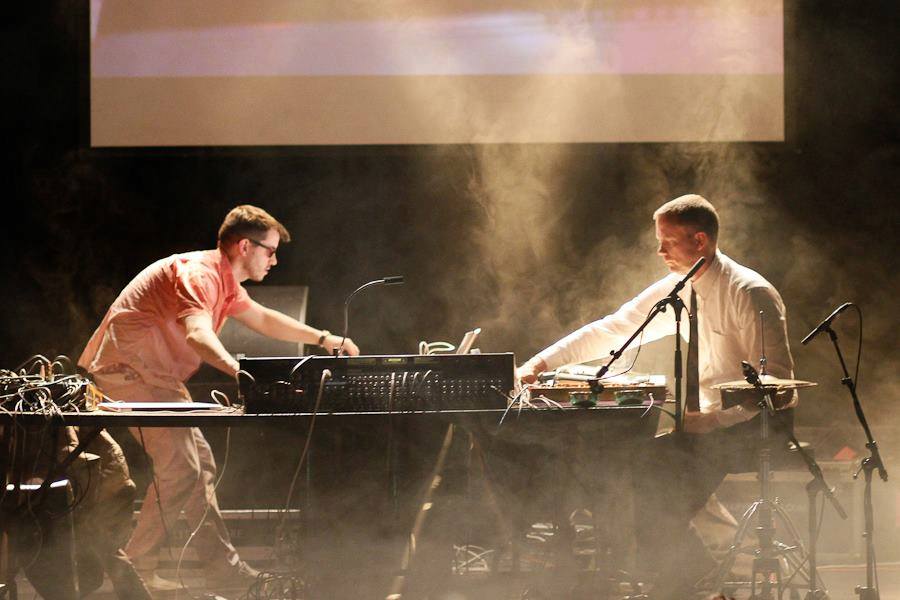With tickets sold out, attendees seated on rows of chairs and sprawled on the floor, the Western Front’s mood was eclectic. Storied electronic artists, such as Matmos, create these wonderful dynamics: sweater-vest aesthetes neck-to-neck with JNCO veterans. And the consistent topic of conversation, the absurd object itself, an Ultimate Care II washing machine sat before the audience, mounted on centre stage. The washing machine, integral to the premise of Matmos’s new album, Ultimate Care II, prompted mirth and theoretical interrogation from the crowd. How many installation provocations or deconstructions of domesticity has the Western Front housed over its decades as an artist’s space? And, to contrive a dichotomy, where would Matmos land on a continuum between theory and farce?
With sights aimed on these analytic presumptions, Bully Fae welcomed us as the evening’s host. Fae amended, meaning to say a host in the sense of a parasitic host. This first jab demonstrated the playful irony of the Bully Fae project. Between comic monologues melding body humour and queer theory, Bully Fae’s hip-hop spoken word, delivered with articulate precision and force, With production akin to C-ORE collaborators, Tri-Angle artists, or a stentorian and minimalist Arca. Bully Fae’s dancing accompanied these musical segments, with a push and pull of body in perfect timing with pointed lyricism and skeletal swaggers of sound. The pared down music and presentation evinced a commanding talent and would’ve been compelling without context.
Fae’s monologues — the first being an injunction for those in the audience who didn’t know whether to laugh or analyze Fae’s stage presence — showcased comedic sense, and pre-empted the clichés of critics and academia (guilty as charged). Their performance cut across the crowd, being some of the most fun the night had to offer. To quote Fae, “I am a master baiter, [and] there is no transcendence. You’ll have to get on my level.”
With repeated epileptic warnings and overtures to the imminent loudness, Bully Fae’s genderqueer performance gave way to what my peer described as a prolonged act of male masturbation. With the lights shut off, Jeff Carey took command of a modified joystick and gamepad, strained his controller stand forward, and began belting out grooves of chugging noise, backed with the spasmodic ejaculations of “over 50 strobe lights.” While keeping the frequencies from a painful register, Carey’s performance was nonetheless an assault. His performance was every media depiction of video-game phenomenology: samples could’ve been planes taking off, or sirens, or cars skidding off the road, maybe automatic assault rifles.
The flattening visual effect of Carey’s light-show rendered everything in silhouette, and pulled the performance into a two-dimensional plane of light and dark. The noise was locked into crushing grooves, and the overall set had this two-dimensional force, which may have been the point. Despite coming to an early end due to a software crash, it could’ve lasted five minutes or five hours, or as long as the machine kept eating quarters.
The ongoing tension between theory and somatic pleasure that both preceding acts played with fed inevitably into that indefatigable symbol, the goddamn washing machine. Matmos’s M.C. Schmidt took centre stage to introduce the set, Drew Daniel placed himself to the side along a series of laptop and effects pedals, and a collaborator sized up the machine. As Schmidt contextualized the Ultimate Care II concept, and the sonic origins of every sound we were about to hear as from the washing machine synthesized or produced acoustically, he requested articles of clothing from the audience to feed the machine. Of course, as Schmidt explained, the outgoing wash water was going to be recycled for the rinse, so the machine would not actually clean anything, but simply “rearrange dirt.”
With this, Matmos began a set that was as tantalizing and vivacious as you’ll ever get out of domestic psychedelia, as heady as it was innervating. The cross-section of melody and hands-on play was strong throughout, as Daniel’s beats were met with acoustic rattles, percussions, along with knocks and slaps against the Ultimate Care II. The curious progression of Ultimate Care II was rendered more surreal with the machine in-person — bubbling melodies and haunting synthesized chords gave emotional affect to a outmoded piece of consumer technology. At one point, content to let the machine rumble unadorned, the band would close their eyes in zen satisfaction; ridiculous and sincere, reaching for bliss in the wash cycle surges.
Further into the performance, as the cycle diminished, runoff water was used to dampen the machine’s surface. The sharp whine of skin rubbing against steel met a look of audacious faux-scandal across Schmidt’s face. The set culminated in a drum-stick duel against the surface of the washing machine, a textural delight rife with water, steel, and production approaching glitchy breakbeat.
Leaving the venue, I overheard one attendee remark that the set was too kitsch for them to enjoy. I’d counter that the Western Front deserves applause for inviting the Matmos crew for the final evening of their Wave Equation series. For a series mired in sampling and field extraction, Matmos broach a promise these electronic practices offer: an ironic (that is, multivarious) conception of the world, and an unfurling of the everyday infinite. With the everyday absurd washing machine present, Matmos were able to realize the complex irony of Ultimate Care II. With complements from Fae and Carey, the evening allowed you to join a vacillating play, no matter where you were sitting.


